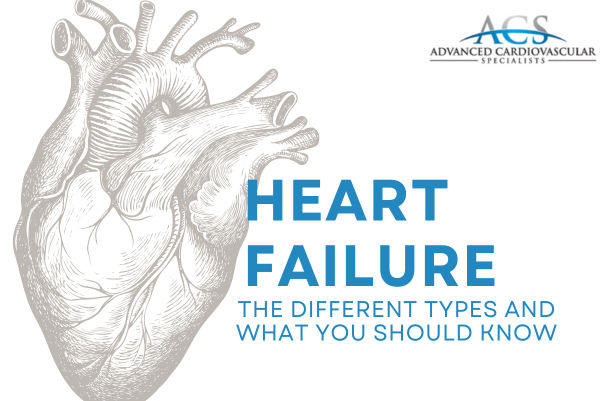Heart failure is a chronic condition that means the heart muscles have become weak, and the heart is no longer working as well as it should. As heart failure progresses, it can affect blood flow around the body and cause damage to other organs. Heart failure typically gets worse over time. It can also become life-threatening, which is why it is important to understand the different types of heart failure and their symptoms.
Types of Heart Failure
Although heart failure usually begins in the left ventricle, there are three types of heart failure (also known as congestive heart failure):
- Left-Sided Heart Failure
As the name suggests, this type of heart failure affects the left ventricle of the heart. There are two types: systolic failure and diastolic failure. In the former, the left ventricle is unable to contract normally, which reduces the amount of blood that can be pumped by the heart. Diastolic failure occurs when the heart muscle becomes stiff, reducing the amount of blood that it can pump. In both of these conditions, the left ventricle works harder to pump blood.
- Right-Sided Heart Failure
In right-sided heart failure, the right ventricle loses the ability to properly pump blood out of the heart. It is usually caused by left-sided failure, which causes damage to the right side over time.
- High-Output Heart Failure
High-output heart failure is characterized by an abnormally high demand of blood flow within the body. This causes a higher than normal volume to be pumped by the heart. However, the high-output is still not enough to meet the body’s needs. This type of heart failure is rare.
Causes of Heart Failure
Heart failure usually occurs when the heart is damaged by other conditions like high blood pressure, heart arrhythmias, heart attack or heart disease. It can also occur suddenly as a result of severe viruses or infections, blood clots in the lungs, allergic reactions, or some medications.
Symptoms of Heart Failure
Although symptoms of heart failure can come and go or change as the condition progresses, the main signs and symptoms of heart failure include:
- Chest pain
- Irregular or fast heartbeat
- Heart palpitations
- Shortness of breath
- Dizziness/fainting
- Fluid retention in the legs
- Abdominal swelling
Preventing Heart Failure
A healthy lifestyle is the key to lowering your risk of heart failure. As with all types of heart disease, the following healthy habits will help reduce the likelihood of developing heart failure and other heart conditions.
- Eat a healthy, balanced diet filled with whole-foods. Limit or avoid processed foods. Limit or avoid foods high in salt, sugar and saturated fat.
- Stay active, and build plenty of physical activity into your daily routine.
- Don’t smoke, or quit smoking if you do smoke.
- Avoid or reduce alcohol consumption.
- Maintain a healthy body weight.
- Manage stress levels.
- Check blood pressure regularly, and take steps to manage blood pressure if it is high.
- Other chronic conditions like diabetes or thyroid disease need to be properly managed to avoid damaging the heart.
If you are diagnosed with heart failure, lifestyle changes and medications may be employed to treat the condition. A low-sodium diet can also be very important. Devices (such as pacemakers) to regulate heart rhythm and even surgery to repair or replace damaged valves can be used to improve blood flow, if necessary. Treatment will depend on your heart function, as will life expectancy.
See your doctor if you are experiencing symptoms of heart failure or any type of heart disease. If you have severe symptoms or if you have heart failure that gets suddenly worse, seek emergency medical treatment.
The team at Advanced Cardiovascular Specialists consists of North Louisiana’s leading experts in cardiovascular care. For more information or to schedule an appointment, please call our office at (318) 798-9400.

